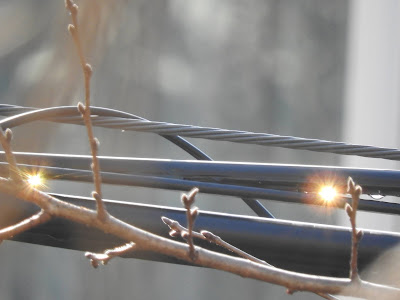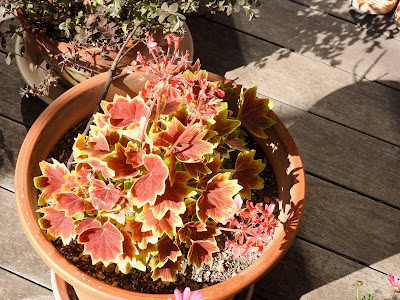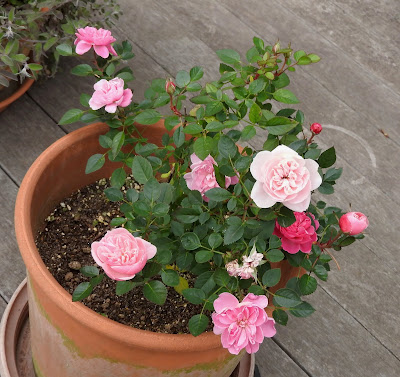目次 / Contents
1) 冬でも元気!- 1月8日 / Fine Even in Winter! - 8th of January
2) コリアンダーと薔薇 - 1月11日
Coriander and Roses - 11th of January
3) 滴の光 - 1月25日 / Drop Lights - 25th of January
4) 冬に咲く - 1月26日 / Bloom in Winter - 26th of January
5) ピンクの雲 - 1月29日 / Pink Clouds - 29th of January
6) 夜明け - 1月30日 / Dawn - 30th of January
7) 一期一会 - 1月31日 / Once-in-a-Lifetime - 31st of January
A. 夕焼け / Sunset
B. 逢魔時 / Ōmagatoki
C. 一期一会 / Ichi-go ichi-e ; Once-in-a-Lifetime
1) 冬でも元気!- 1月8日
Fine Even in Winter! - 8th of January
 |
| ピンクのポインセチア? 当初、ピンクのポインセチアでしたが緑になってしまいました。 でも元気なので、OKです。 Pink Poinsettia? Initially it was pink poinsettia, but it has turned green. But this is fine, so it's alright. |
2) コリアンダーと薔薇 - 1月11日
Coriander and Roses - 11th of January
 |
| 種から育てたコリアンダー ヒョロヒョロだったコロアンダーが立派に育ちました。 お料理にも使えて嬉しいです。 Coriander Grown from Seeds Coriander, which was very slender, grew up splendidly. I am happy that it can be used for cooking as well. |
3) 滴の光 - 1月25日
Drop Lights - 25th of January
 |
| 滴の光 電線の滴が豆星のように光っていました。 Drop Lights The drops on the cables were shining like miniature stars. |
4) 冬に咲く - 1月26日
Bloom in Winter - 26th of January
季節的に元気がなさそうな植物はあります。
でも季節になれば大丈夫!そう信じています。
冬でも元気な植物は、こちらを喜ばせてくれます。
Bloom in Winter - 26th of January
There are some plants that seem to be seasonally weak.
But it's okay when the season comes! I believe so.
Plants that are healthy even in winter please us.
 |
| この薔薇は友人RIさんにいただいたので大切にしています。 I cherish this rose because my friend RI gave it to me |
 |
オキザリス 地植えのオキザリスが咲き始めました。 まだ、寒いのに大丈夫? Oxalis The ground-planted Oxalis have begun to bloom. Are they okay if it's still cold? |
5) ピンクの雲 - 1月29日
Pink Clouds - 29th of January
7) 一期一会 - 1月31日
Once-in-a-Lifetime - 31st of January
A. 夕焼け / Sunset
夕焼けがとても綺麗なので、夫Rと共に外へ出て見に行きました。
彼は夕焼けが綺麗な日は、頻繁に出かけ、夕焼けや夕焼けの富士山を見てきます。
私は出不精なので、家から眺めて、それで終わりです。
ですが、最近、そんな自分を反省し、彼ほどではないにしても、散歩には出る様にしています。
この日も、Rが
「すごい、夕焼けが綺麗なんだ!見にゆこう!」
と誘ったので、出かけたのです。
Rは夜型でニンニクが嫌いなので、私はヴァンパイアのようだと時々言います。
'夕焼け小焼け' : 1919
歌詞:中村雨紅 (ナカムラウコウ /1897 - 1972 )
作曲:草川 信 (クサカワ シン / 1893 - 1948)
 |
| 相模湾を見る この写真が好きです。 See Sagami Bay I like this photograph. |
Sunset
The sunset is so beautiful that I went out with my husband R to see it.
On days when the sunset is beautiful, he often goes out to see the sunset and Mt. Fuji at sunset.
I am a stay-at-home, so look from home and that's it.
However, recently, I reflect on myself and try to go for a walk, if not as much as he does.
R also asked on this day
"Wow, the sunset is beautiful! Let's go and see it!"
so I went out.
'Yuyake Koyake' is a song about going home at sunset, but we're going out ... we are like vampires? (But we came home quickly.)
R is a nocturnal and hates garlic, so I sometimes say he is like a vampire.
'Yuyake Koyake ': 1919 / Lyrics : Uko Nakamura (1897 - 1972) / Composition : Shin Kusakawa (1893 - 1948)
According to My Japan Guide,
"Yuyake koyake (Sunset) is a popular children song composed by Shin Kusakawa (1893 - 1948) who worked as a music teacher.
All over Japan, every evening at 5 p.m., this music is loudly played for 20/30 seconds and then stops.
The song is used as a signal meaning that Japanese children finish school and go home."
 |
| なんだか、せつなくなる.... Somehow, I feel heartrending.... |
 |
| 別の世界があるように感じます。 I feel like there is another world. |
 |
| うわ〜っ!綺麗い!と思わず言ってしまいます。 実際の様子が写真で表現できなくてすみません... でも想像できますか? "Wow! It's beautiful! " I say it unintentionally. I'm sorry I couldn't express the actual situation with my photographs ... But can you imagine? |
B. 逢魔時 / Ōmagatoki
 |
| 薄明 : ★ 日の出前や、日の入り後の空が薄明るいことを 薄明 (ハクメイ)と呼ぶのだと知りました。 英語のトワイライト(twilight)も薄明の1つだそうです。 'トワイライト'と聞くと、ドラマの'トワイライト・ゾーン' を 思い浮かべるのは私だけでしょうか? Hakumei : Twilight I found out that the dim sky before sunrise and after sunset is called twilight : Hakumei (薄明) in Japanese. I knew the word, 'twilight', though I didn't know Hakumei. When I hear 'twilight', am I the only one who thinks of the drama 'Twilight Zone'? |
Wikiで面白い説明を見つけました。
"日の出前の「彼者誰(かわたれ)」は「彼は誰」、日没後の「黄昏(たそがれ)」は「誰そ彼」が元々の意味であり、いずれも薄暗くて人の見分けがつきにくいことから、このように呼ばれる。
また、日の入り後については宵あるいは宵のうちとも言い、日没直後(下記の市民薄明に相当する)は宵の口とも言う。
 |
| 逢魔時 『今昔画図続百鬼 (コンジャクガズゾクヒャッキ)』(1779)より 画 : 鳥山 石燕 (トリヤマ セキエン / 1712 - 1788) "黄昏をいふ。百魅の生ずる時なり。 世俗小児を外にいだす事を禁む。 一説に王奔時とかけり。 これは王奔前漢の代をうばひしかど、程なく後漢の代となりし故、 昼夜のさきひを両漢の間に比してかくいふならん" Ōmagatoki From "Konjaku Gazu Zoku Hyakki"(1779) By Toriyama Sekien (1712 - 1788) 画像は下記より / This from below ★ |
I found an interesting explanation on the Japanese Wiki, about Twilight : Hakumei,
According to the Wik, (Translated by me)
"This time zone is also called Oumagatoki (逢魔時) or Ōmagatoki (大禍時), and it has been thought that it is a time when it is easy to encounter monsters such as Yōkai and Ghosts. "
 |
| マジック・アワー 日没前の薄明は、マジック・アワーとも呼ばれるそうです。 Magic Hour The twilight : Hakumei before sunset is also called the 'Golden Hour' : 'Magic Hour' in Japanese.  |
Ichi-go ichi-e ; Once-in-a-Lifetime
夜明けも夕焼けも毎日違って見えます。
一期一会 (イチゴイチエ) なんですね。
Rが頻繁に夕焼けを見に出かけるのは、一期一会を彼なりに感じているからなのかもしれません。(朝は弱いから出かけない..笑)
彼と一緒に私が出かけたら、彼は喜び、確かに夕焼けは美しいし、時には一緒に夕焼けを見に出るのも悪くないなっと思った次第...。
'一緒に夕焼けを見に出る' ということが、後になって貴重に思えるのかな?とも思います。
 |
| 家に向かっている時の風景 紅い色が濃い西の空... 実際の空は写真よりもずっと赤いのです! Scenery When Heading Home The west sky with a deep red colour ... The actual sky is much redder than the photographs! |
Ichi-go ichi-e ; Once-in-a-Lifetime
Dawn and sunset look different every day.
It's a once-in-a-lifetime meeting (Ichi-go ichi-e).
The reason why R often goes out to see the sunset may be that he feels the meeting once in a while. (He doesn't go out in mornings because he is weak in the morning .. Laugh)
When I went out with him, he was happy and the sunset was undoubtedly beautiful, so I thought it wouldn't be a bad idea to go out with him sometimes.
Also, afterwards I may think that "Yes, it was valuable to go out to see the sunset together"



















0 件のコメント:
コメントを投稿